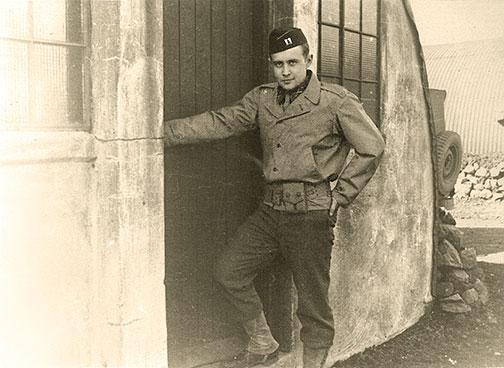Sept. 7, 1917 – Oct. 23, 2013
The death of Earl Staten Browning *53 in a Charlottesville retirement home at age 96 was noted as far away as London, where The Telegraph praised the former U.S. Army colonel for his dogged pursuit of notorious Nazi war criminal Klaus Barbie, the “Butcher of Lyon.” It was just one adventure among many for the career military officer who saw service around the world.
Growing up in Iowa City, Browning milked the cow on cold mornings and dreamed of becoming a globe-trotting adventurer like the heroes of old-time boys’ novels. All his life he read voraciously, piling volumes in front of volumes on crowded shelves and, eventually, arranging bookcases in front of bookcases.
World War II brought the excitement Browning craved. The young would-be reporter, a graduate of the University of Iowa, heard the news of Pearl Harbor, then dashed to the train station to send the Army a telegram: “Am instantly available for active duty.”
So began a colorful stint in the Counter Intelligence Corps in London and Iceland, followed by a landing in Normandy after D-Day. Browning entered Dachau just hours after it was liberated, seeing corpses stacked like cordwood and vowing justice against war criminals.
As he chased enemy agents throughout Germany in the chaotic months following Nazi surrender, at the top of his wanted list was Barbie, the former Gestapo chief of Lyon, France, who had ordered the death, torture, and deportation of thousands of Jews and resistance fighters. Browning was disgusted to learn that Barbie was under American protection for providing tips against Communists, the new enemy, and argued that he should be detained for interrogation. He briefly prevailed, jailing Barbie for six months, but the Americans later sent the Nazi officer to live in Bolivia. Not until the 1980s would Barbie stand trial, having been extradited to France, where he died in prison. Browning’s honorable role in the sordid Barbie affair was revealed to the world.
After his military service, Browning came to Princeton for graduate study in international relations and politics, reveling in the intellectual atmosphere. A further military career followed, with appointments in South Korea, the Pentagon, and in Saigon at the height of the Vietnam War. He fell in love with travel, eventually visiting more than 100 countries, some of them in vigorous old age.
“He was a person of the mind,” recalls his son E.S. “Jim” Browning ’71, “and like a walking encyclopedia.” Always precise, Browning once became visibly pained when, in telling a story about Utah Beach during the Normandy invasion, he couldn’t quite recall the spelling of a comrade’s middle name. That was 60 years after the fact.
In later life, the retired colonel became celebrated for his long-ago arrest of Barbie, but, Jim Browning explains, that was only one shining episode in a life devoted to a single, overriding principle: “Always do the right thing.”
W. Barksdale Maynard ’88 is the author, most recently, of Princeton: America’s Campus (The Pennsylvania State University Press).


